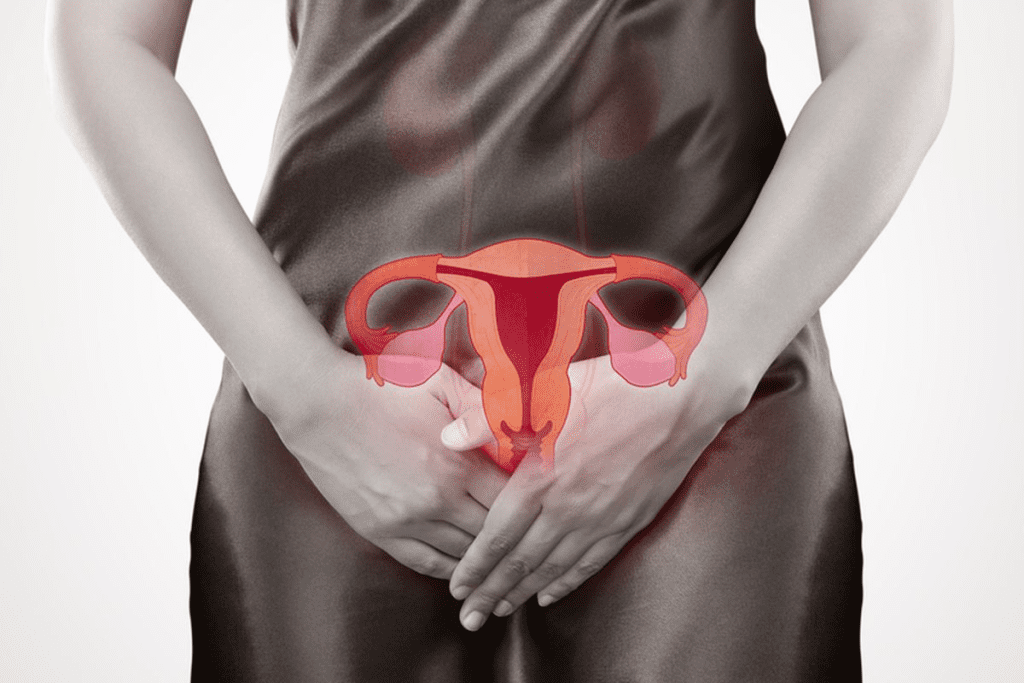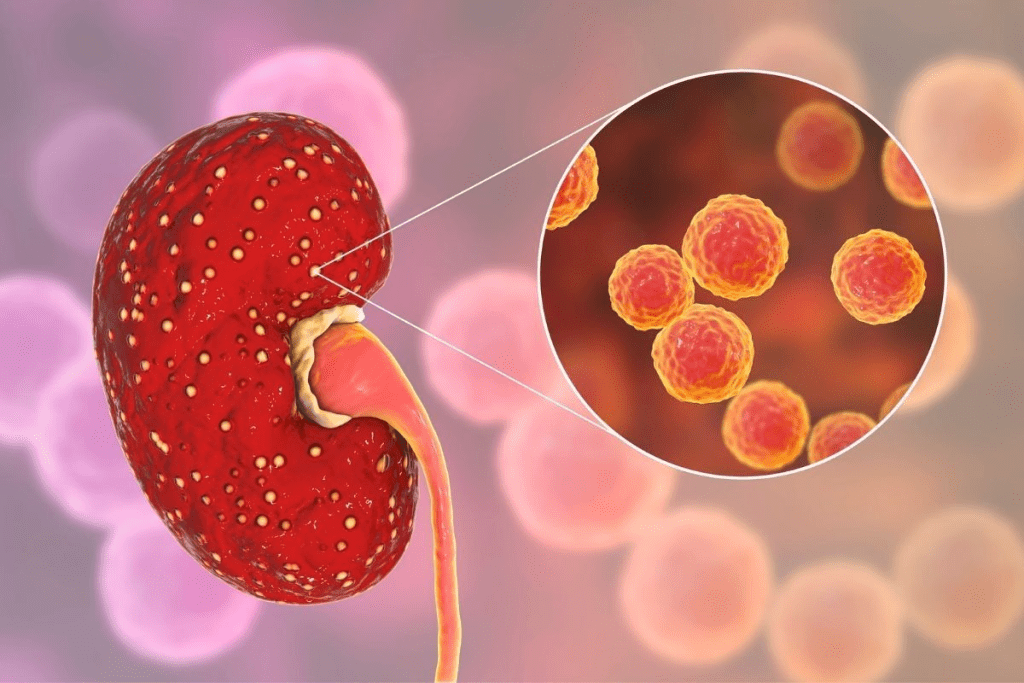Why do I have bacteria in my urine but no UTI? Learn about asymptomatic bacteriuria and the crucial, powerful difference between colonization and infection.
Many people worry about having bacteria in their urine without UTI symptoms. This is called asymptomatic bacteriuria. It means bacteria are in the urine, but there is no infection.

Asymptomatic bacteriuria gets more common with age, hitting a big chunk of seniors. Research shows up to 40-50% of those over 80 might have it. Yet, not everyone needs treatment, as having bacteria doesn’t always mean an infection will happen.
Top hospitals like Liv Hospital understand this well. They know giving antibiotics when not needed can actually harm more than help.
Key Takeaways
- Asymptomatic bacteriuria is common, mostly in older adults.
- This condition means bacteria are in the urine without UTI symptoms.
- It’s more common with age, hitting up to 40-50% of those over 80.
- Not everyone needs treatment, as it doesn’t always mean an infection.
- Unnecessary antibiotic use can be harmful.
Understanding Asymptomatic Bacteriuria: When Bacteria Don’t Cause Symptoms
Bacteria in urine don’t always mean you have a urinary tract infection (UTI). This is called asymptomatic bacteriuria. It’s when bacteria are in your urine, but you don’t have the usual UTI symptoms like pain when you pee or needing to pee a lot.

What asymptomatic bacteriuria means for your health
For most people, asymptomatic bacteriuria isn’t a big deal. But, it can be a concern for pregnant women or those getting urologic procedures. Bacteria like Klebsiella pneumoniae or Escherichia coli in your urine might not hurt you right away. B, it’s something to watch out for in certain situations.
In healthy folks, you might not need to treat asymptomatic bacteriuria. It might even go away by itself. But it’s important to know the risks, mainly for people who are more vulnerable.
How bacteriuria differs from a urinary tract infection
The main difference between asymptomatic bacteriuria and a UTI is symptoms. UTIs have symptoms like pain when you pee, needing to pee a lot, or belly pain, along with bacteria in your urine. Asymptomatic bacteriuria doesn’t have these symptoms, even though bacteria are there.
Knowing this difference is key to the right treatment. Treating asymptomatic bacteriuria when it’s not needed can lead to antibiotic resistance. This makes future infections harder to treat.
Common bacteria types found in urinalysis results
Escherichia coli is the most common bacterium found in both UTIs and asymptomatic bacteriuria. Other bacteria, like Klebsiella pneumoniae, can also be present. The type of bacteria can affect how risky it is and how it should be managed.
- Escherichia coli: The most prevalent bacterium in both UTIs and asymptomatic bacteriuria.
- Klebsiella pneumoniae: Can be more concerning due to its high antibiotic resistance.
- Other bacteria: Various other bacteria can be present, each with different implications.
Who Is Most Likely to Have Bacteria in Urine Without UTI Symptoms?
It’s important to know who might have bacteria in their urine without UTI symptoms. This is because some people can have bacteria in their urine without feeling sick. This condition, called asymptomatic bacteriuria, affects different groups of people in different ways.
Prevalence Rates Across Different Age Groups
As people get older, the chance of having bacteria in their urine without symptoms goes up. Research shows that up to 15% of women and men between 6 and -80 years old might have this issue. After 80, the number can jump to 40-50%.
Key statistics on asymptomatic bacteriuria prevalence include:
- Young women: Generally lower rates, but can be higher in certain populations.
- Older adults (65-80 years): Up to 15% or greater prevalence.
- Very old adults (over 80 years): Prevalence can be as high as 40-50%.
Higher Risk in Older Adults and Long-term Care Residents
Older adults and those in long-term care face a higher risk of having bacteria in their urine without symptoms. This is due to several reasons. These include less mobility, the use of urinary catheters, and other health issues that weaken the urinary system.
It’s essential to differentiate between asymptomatic bacteriuria and true urinary tract infections in these populations to avoid unnecessary antibiotic use.

Special Considerations for People with Diabetes and Catheter Users
People with diabetes are more likely to get UTIs. This is because their immune system is weaker, nd they might have nerve damage affecting their bladder. Catheter users also face a higher risk of getting bacteria in their urine. This is because bacteria can enter the urinary system through the catheter.
Special considerations for these groups include:
- Regular monitoring for signs of UTI or asymptomatic bacteriuria.
- Proper catheter care to minimize the risk of infection.
- Managing diabetes effectively to reduce the risk of urinary tract complications.
By understanding these risk factors and taking the right steps, healthcare providers can better manage asymptomatic bacteriuria in at-risk populations.
When Asymptomatic Bacteriuria Requires Medical Treatment
Asymptomatic bacteriuria is usually not a worry, but some people might need treatment. This condition means bacteria are in the urine without symptoms. It’s common in many groups.
Guidelines for Treating Bacteria in Urine During Pregnancy
Pregnant women need special care for this condition. Guidelines say pregnant women should be tested for bacteria in their urine. If they have it, they should take antibiotics to avoid serious problems.
Treating asymptomatic bacteriuria in pregnancy is key. It helps prevent early labor and other pregnancy issues.
Treatment Before Urologic Procedures
People having urologic procedures might also need treatment. Bacteria in the urine can lead to serious infections after surgery. So, treating asymptomatic bacteriuria before surgery is advised to lower these risks.
“The presence of asymptomatic bacteriuria is a significant risk factor for developing urinary tract infections after urologic surgery.” “ A Urologist
The 2024 Multicenter Study on Bacteremia Risk
A 2024 study looked at the risk of blood infections in patients with asymptomatic bacteriuria during urologic procedures. It showed that treating the condition before surgery greatly lowers the risk of blood infections. This study backs up current guidelines for treating asymptomatic bacteriuria in certain situations.
Knowing when to treat asymptomatic bacteriuria is important. It helps avoid overusing antibiotics and keeps people safe from serious problems.
Why Doctors Often Recommend Against Treating UA Bacteria Without Symptoms
Having bacteria in your urine doesn’t always mean you need treatment. This is true if you don’t have any symptoms. Asymptomatic bacteriuria is common, mainly in certain groups of people.
The Risks of Unnecessary Antibiotic Treatment
Doctors often say no to treating urine bacteria without symptoms. This is because antibiotics can cause problems. Overusing them can make infections harder to fight in the future.
According to, too many antibiotics are a big part of the antibiotic resistance issue. Antibiotics can also have side effects, from mild to severe. They can upset the balance of good bacteria in your body, leading to more infections.
How Long Can Bacteriuria Persist Without Causing Problems
Asymptomatic bacteriuria can last a long time without causing trouble. Studies show that most people with it won’t get UTIs. It can be short-term, come and go, or stay for a long time.
Things like age, health, and using a urinary catheter can affect how long it lasts. Older adults and people with diabetes are more likely to have it for a long time.
Potential Complications from Klebsiella and Other Bacteria
Even though most urine bacteria don’t need treatment, some can be risky. Klebsiella bacteria, for example, can cause serious infections, mainly in hospitals. If you have Klebsiella in your urine, you might face bigger problems, like infections during urologic procedures.
In short, treating urine bacteria depends on symptoms and your health. Knowing the risks of antibiotics and the dangers of some bacteria helps make better choices for your care.
Conclusion: What to Do If You Have Bacteria in Your Urine
Having bacteria in your urine doesn’t always mean you have a urinary tract infection (UTI). This is called asymptomatic bacteriuria. It’s common in older adults and people with diabetes. Only certain people, like pregnant women, need treatment.
If you have asymptomatic bacteriuria, listen to your doctor. Taking antibiotics when not needed can cause problems. Most of the time, it’s okay and won’t cause issues.
By following your doctor’s advice, you can avoid unnecessary treatment. If you have bacteria in your urine but no UTI symptoms, talk to your doctor. They will tell you what to do next.
FAQ
What is asymptomatic bacteriuria?
Asymptomatic bacteriuria is when bacteria are in your urine, but you don’t feel sick. It’s common in older adults, people with diabetes, and those who use catheters.
How does asymptomatic bacteriuria differ from a UTI?
Asymptomatic bacteriuria means you have bacteria in your urine but no symptoms. A UTI, on the other hand, has symptoms like pain when you pee and needing to pee a lot. Just having bacteria doesn’t mean you have a UTI.
What types of bacteria are commonly found in urinalysis results?
Urinalysis often finds bacteria like Escherichia coli (E. coli) and Klebsiella pneumoniae. These can be in your urine without making you sick.
Can Klebsiella in urine be fatal?
Klebsiella pneumoniae can cause serious infections, mainly in people with weak immune systems. If not treated, it can lead to serious conditions like sepsis.
How long can you have a UTI without knowing it?
Some people might have a UTI without any symptoms. This makes it hard to know how long they’ve had it. But some bacteria can stay in your urine for a long time without causing problems.
When is treatment necessary for asymptomatic bacteriuria?
Treatment is needed for asymptomatic bacteriuria in certain cases. For example, during pregnancy or before certain medical procedures. Doctors often recommend treatment for pregnant women to prevent issues.
Why do doctors advise against treating asymptomatic bacteriuria with antibiotics unless necessary?
Using antibiotics when not needed can lead to antibiotic resistance. This makes future infections harder to treat. Antibiotics can also upset the balance of your gut bacteria, causing problems.
How long can bacteriuria last without causing problems?
Bacteriuria can last for a long time without causing symptoms in many people. But how long it lasts depends on your health and if you have a catheter.
What should I do if I have bacteria in my urine?
If you find bacteria in your urine, talk to your doctor. They will decide if you need treatment based on your situation.
References
- An, B. W., Törnblom, S., & Jensen, J. U. (2021). Asymptomatic bacteriuria in older adults: prevalence, virulence, and antibiotic resistance. Journal of Geriatric Urology / PMC.https://pmc.ncbi.nlm.nih.gov/articles/PMC7918685/
- Infectious Diseases Society of America. (2005). Guidelines for the Diagnosis and Treatment of Asymptomatic Bacteriuria in Adults. Clinical Infectious Diseases, 40(5), 643“654.https://academic.oup.com/cid/article/40/5/643/363229
- EAU Guidelines on Urological Infections. (latest). Asymptomatic Bacteriuria. European Association of Urology.https://uroweb.org/guidelines/urological-infections/chapter/the-guideline

































